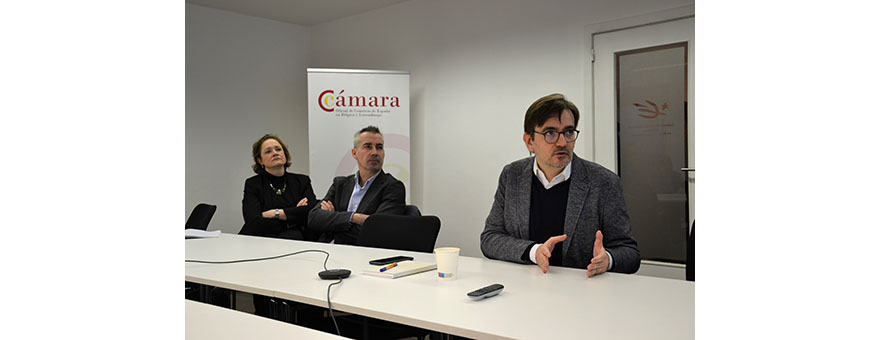Breakfast-debate with Lluis Saurí, Head of Unit of the Economists Team of the Directorate-General for Competition of the European Commission
On Thursday, 19 January, the Official Spanish Chamber of Commerce in Belgium and Luxembourg held, within the framework of its Working Committee “Competence Spain“, a hybrid breakfast-debate with Lluís Saurí Romero, Head of Unit of the Economists Team of the Directorate-General for Competition of the European Commission (DG COMP). The presentation was on “Competition policy, green transition and sustainability objectives”.
The breakfast-debate started with a brief introduction by Miguel Troncoso, President of the Chamber’s “Competencia España” Working Committee. Saurí then began his speech by contextualising the need to carry out a rigorous control of State aid that facilitates maintaining the criteria of efficiency and competition in the markets in a post-COVID era and in the current framework of the energy crisis.
The decarbonisation that the European Green Deal envisages for 2050 is one of the challenges that Saurí mentioned as an example of the need to emphasise resource efficiency through the control of State aid.
Market distorsions
With the successive crises of recent years, public investment has taken on a special role. As Saurí explained, this state aid must be duly audited to ensure that its impact is as intended by the institutions, as these injections of capital inevitably cause distortions in the market.
In this respect, the challenge lies, in Saurí’s words, in finding a balance that “facilitates the achievement of objectives while minimising risks”. The speaker also explained several of the criteria that make it possible to resolve this coexistence between economic incentive and distortion of competition.
During his speech, Saurí also gave a brief historical review of State aid control, analysed how this control must be adapted to the circumstances of each historical moment and defended the fact that, if carried out correctly, State aid control can be “a good instrument for designing intelligent industrial policies”.
After the speaker’s intervention, there was a Q&A session in which attendees were able to share their concerns on the subject under debate.


